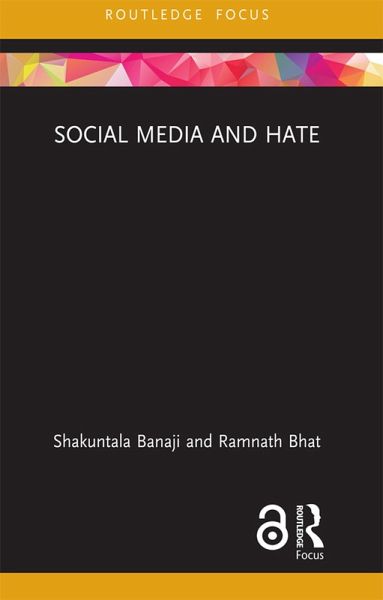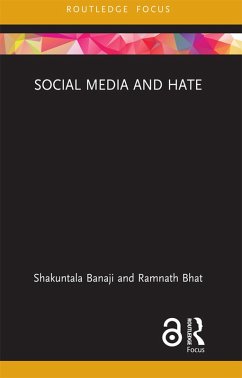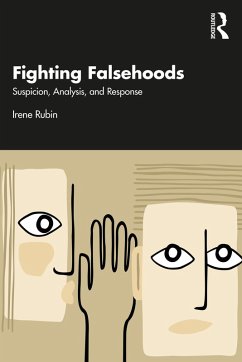
Social Media and Hate (eBook, ePUB)
Versandkostenfrei!
Sofort per Download lieferbar
0,00 €
inkl. MwSt.
Weitere Ausgaben:

PAYBACK Punkte
0 °P sammeln!
Using expert interviews and focus groups, this book investigates the theoretical and practical intersection of misinformation and social media hate in contemporary societies.Social Media and Hate argues that these phenomena, and the extreme violence and discrimination they initiate against targeted groups, are connected to the socio-political contexts, values and behaviours of users of social media platforms such as Facebook, TikTok, ShareChat, Instagram and WhatsApp. The argument moves from a theoretical discussion of the practices and consequences of sectarian hatred, through a methodologica...
Using expert interviews and focus groups, this book investigates the theoretical and practical intersection of misinformation and social media hate in contemporary societies.
Social Media and Hate argues that these phenomena, and the extreme violence and discrimination they initiate against targeted groups, are connected to the socio-political contexts, values and behaviours of users of social media platforms such as Facebook, TikTok, ShareChat, Instagram and WhatsApp. The argument moves from a theoretical discussion of the practices and consequences of sectarian hatred, through a methodological evaluation of quantitative and qualitative studies on this topic, to four qualitative case studies of social media hate, and its effects on groups, individuals and wider politics in India, Brazil, Myanmar and the UK. The technical, ideological and networked similarities and connections between social media hate against people of African and Asian descent, indigenous communities, Muslims, Dalits, dissenters, feminists, LGBTQIA communities, Rohingya and immigrants across the four contexts is highlighted, stressing the need for an equally systematic political response.
This is an insightful text for scholars and academics in the fields of Cultural Studies, Community Psychology, Education, Journalism, Media and Communication Studies, Political Science, Social Anthropology, Social Psychology, and Sociology.
Social Media and Hate argues that these phenomena, and the extreme violence and discrimination they initiate against targeted groups, are connected to the socio-political contexts, values and behaviours of users of social media platforms such as Facebook, TikTok, ShareChat, Instagram and WhatsApp. The argument moves from a theoretical discussion of the practices and consequences of sectarian hatred, through a methodological evaluation of quantitative and qualitative studies on this topic, to four qualitative case studies of social media hate, and its effects on groups, individuals and wider politics in India, Brazil, Myanmar and the UK. The technical, ideological and networked similarities and connections between social media hate against people of African and Asian descent, indigenous communities, Muslims, Dalits, dissenters, feminists, LGBTQIA communities, Rohingya and immigrants across the four contexts is highlighted, stressing the need for an equally systematic political response.
This is an insightful text for scholars and academics in the fields of Cultural Studies, Community Psychology, Education, Journalism, Media and Communication Studies, Political Science, Social Anthropology, Social Psychology, and Sociology.
Dieser Download kann aus rechtlichen Gründen nur mit Rechnungsadresse in A, B, BG, CY, CZ, D, DK, EW, E, FIN, F, GR, HR, H, IRL, I, LT, L, LR, M, NL, PL, P, R, S, SLO, SK ausgeliefert werden.













